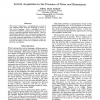Free Online Productivity Tools
i2Speak
i2Symbol
i2OCR
iTex2Img
iWeb2Print
iWeb2Shot
i2Type
iPdf2Split
iPdf2Merge
i2Bopomofo
i2Arabic
i2Style
i2Image
i2PDF
iLatex2Rtf
Sci2ools
AAAI
1994
1994
Lexical Acquisition in the Presence of Noise and Homonymy
This paper conjectures a computational account of how children might learn the meanings of words in their native language. First, a simplified version of the lexical acquisition task faced by children is modeled by a precisely specified formal problem. Then, an implemented algorithm for solving this formal problem is presented. Key advances of this algorithm over previously proposed algorithms are its ability to learn homonymous word senses in the presence of noisy input and its ability to scale up to problems of the size faced by real children.
AAAI 1994 | Formal Problem | Homonymous Word Senses | Intelligent Agents | Lexical Acquisition Task |
| Added | 02 Nov 2010 |
| Updated | 02 Nov 2010 |
| Type | Conference |
| Year | 1994 |
| Where | AAAI |
| Authors | Jeffrey Mark Siskind |
Comments (0)

